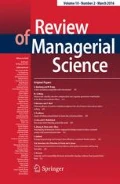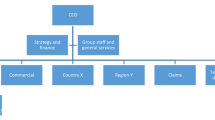Abstract
Although the auditor is one of the most important external business partners for an SME in terms of knowledge transfer and the mitigation of internal risks, an investigation of the performance drivers of the qualitative change induced by auditing has not taken place to date. Based on 166 auditor–client dyads (audit partners, CEOs/CFOs) of SMEs in Germany, we narrow this gap by examining the effects of auditor’s trust and auditor’s confidence in the client management and auditor’s identification with the client firm on the qualitative change induced (i.e. level of knowledge transfer, improvement of the internal control system). We find that the auditor’s identification with the client firm and the auditor’s confidence in the client management are highly relevant to the level of qualitative change perceived by the client, while previously used indicators of auditor expertise (e.g. audit firm size, level of non-audit services) do not reveal a significant effect. Interestingly, auditor’s trust in the client does not exert a significant effect, which might be due to the special setting of auditor–client relationships. In addition to the theoretical contributions, the findings have practical implications for SMEs as well as for auditors.
Similar content being viewed by others
Notes
In line with the definition of an SME of the Small Business Size Standards 2014, published by the US Small Business Administration (http://www.sba.gov), we only take into account those firms with <500 employees.
References
Asare SK, McDaniel LS (1996) The effects of familiarity with the preparer and task complexity on the effectiveness of the audit review process. Account Rev 71:139–160
Ashforth B, Mael F (1989) Further positive effects on cooperation, prosocial behaviors and individual motivation. Acad Manag Rev 14:20–39
Bamber EM, Iyer VM (2007) Auditors’ identification with their clients and its effect on auditors’ objectivity. Auditing 26(2):1–24
Barney JB, Hansen MH (1994) Trustworthiness as a source of competitive advantage. Strateg Manag J 15:175–190
Becker CL, DeFond ML, Jiambalvo J, Subramanyam KR (1998) The effect of audit quality on earnings management. Contemp Account Res 15:1–24
Bhattacharjee S, Moreno KK, Riley T (2012) The interplay of interpersonal affect and source reliability on auditors’ inventory judgments. Contemp Account Res 29(4):1087–1108
Bird B (1995) Toward a theory of entrepreneurial competency. In: Katz JA, Brockhaus RH (eds) Advances in entrepreneurship, firm emergence and growth, 2nd edn. Jai Press Inc., Greenwich, pp 51–72
Blackburn R, Carey P, Tanewski GA (2010) Business advice to SMEs: professional competence, trust and ethics, vol 119. Association of Chartered Certified Accountants, London
Boter H, Lundström A (2005) SME perspectives on business support services: the role of company size, industry and location. J Small Bus Enterp Dev 12(2):244–258
Chow CW (1982) The demand for external auditing: size, debt and ownership influences. Account Rev 57(2):272–291
Chung J, Monroe G (2001) A research note on the effects of gender and task complexity on an audit judgment. Behav Res Account 13:111–125
Chung S, Narasimhan R (2001) Perceived value of mandatory audits of small companies. Managerial Auditing J 16(3):120–123
Cohen J, Krishnamoorthy G, Wright A (2010) Corporate governance in the post Sarbanes–Oxley era: auditors’ experiences. Contemp Account Res 27:751–786
Collis J, Jarvis R, Skerratt L (2004) The demand for the audit in small companies in the UK. Account Bus Res 34(2):87–100
Cummings LL, Bromiley P (1996) The organisational trust inventory (OTI): development and validation. In: Kramer RM, Tyler TR (eds) Trust in organisations: frontiers of theory and research. SAGE Publication Inc., Thousands Oaks, pp 302–330
Davidsson P, Honig B (2003) The role of social and human capital among nascent entrepreneurs. J Bus Ventur 18(3):301–331
DeAngelo L (1981) Auditor independence, ‘low balling’, and disclosure regulation. J Account Econ 3:113–127
DeRuyter K, Wetzels M (1999) Commitment in auditor–client relationships: antecedents and consequences. Acc Organ Soc 24:57–75
Dopuch N, Simunic D (1980) The nature of competition in the auditing profession: a descriptive and normative view. In: Buckley J, Weston F (eds) Regulation and the accounting profession, vol 34. pp 283–289
Doz YL (1996) The evolution of cooperation in strategic alliances: initial conditions or learning process? Strateg Manag J 17(1):55–83
Foreman P, Whetten DA (2002) Member’s identification with multiple-identity organizations. Organ Sci 13:618–635
Gibbins M, Trotman KT (2002) Audit review: managers’ interpersonal expectations and conduct of the review. Contemp Account Res 19:411–444
Golden-Biddle K, Rao H (1997) Breaches in the boardroom: organizational identity and conflicts of commitment in a nonprofit organization. Organ Sci 8:593–611
Grant RM (1996) Toward a knowledge-based theory of the firm. Strateg Manag J 17(1):109–122
Gulati R (1995) Does familiarity breed trust? The implications of re-peated ties for contractual choice in alliances. Acad Manag J 38(1):85–112
Howorth C, Moro A (2006) Trust within entrepreneur bank relationships: insights from Italy. Entrepreneurship Theory Pract 30(4):495–517
Jarvenpaa SL, Knoll K, Leidner DE (1998) Is anybody out there? Antecedents of trust in global virtual teams. J Manag Inf Sys 14(4):29–64
Kane AA (2010) Unlocking knowledge transfer potential: knowledge demonstrability and superordinate social identity. Organ Sci 21(3):643–660
Kerler WA, Killough LN (2009) The effects of satisfaction with a client’s management during a prior audit engagement, trust, and moral reasoning on auditors’ perceived risk of management fraud. J Bus Ethics 85(2):109–136
Khurana IK, Raman KK (2004) Litigation risk and the financial reporting credibility of Big 4 versus non Big 4 audits: evidence from Anglo American countries. Account Rev 79:473–495
King RR (2002) An experimental investigation of self-serving biases in an auditing trust game: the effect of group affiliation. Account Rev 77:265–284
Knechel WR, Niemi L, Sundgren S (2008) Determinants of auditor choice: evidence from a small client market. Int J Auditing 12(1):65–88
Ko D-G, Kirsch LJ, King WR (2005) Antecedents of knowledge transfer from consultants to clients in enterprise system implementations. MIS Q 29(1):59–85
Lewicki RJ, Bunker BB (1996) Developing and maintaining trust in work relationships. In: Kramer RR, Tyler TR (eds) Trust in organisations: frontiers of theory and research. SAGE Publications Inc, Thousands Oaks, pp 114–139
Luhmann N (2000) Familiarity, confidence, trust: problems and alternative. Trust: making and breaking cooperative relations. Department of Sociology - University of Oxford, Oxford
Mayer RC, Davies JA (1999) The effect of the performance appraisal system on trust for management: a field quasi-experiment. J Appl Psychol 84(1):123–136
Mayer RC, Davies JA, Schoorman FD (1995) An integrative model of organisational trust. Acad Manag Rev 20(3):709–734
McEvily B, Zaheer A (eds) (2006) Does trust still matters? Research on the role of trust in inter-organisational exchange Handbook of Trust Research. Edgar Elgar, Cheltenham
McKinley W, Ponemon LA, Schick A (1996) Auditors’ perceptions of client firms: the stigma of decline and the stigma of growth. Acc Organ Soc 21:193–213
Meier M (2011) Knowledge management in strategic alliances: a review of empirical evidence. Int J Manag Rev 13:1–23
Möllering G (2001) The nature of trust: from Georg simmel to a theory of expectation, Interpretation and Suspension. Sociology 35(2):403–420
Moore DA, Tetlock PE, Tanlu L, Bazerman MH (2006) Conflicts of interest and the case of auditor independence: moral seduction and strategic issue cycling. Acad Manag Rev 31:10–29
Moro A, Fink M (2013) Loan manager trust and credit access for SMEs. J Bank Finance 37(3):927–936
Mulder M (2006) EU-level competence development projects in agri-food-environment: the involvement of sectoral social partners. J Eur Ind Train 30(2):80–99
Muthusamy SK, White MA (2005) Learning and knowledge transfer in strategic alliances: a social exchange view. Org Stud 26(3):415–441
Niskanen J, Karjalainen J, Niskanen M, Karjalainen J (2011) Auditor gender and corporate earnings management behavior in private Finnish firms. Manag Auditing J 26:778–793
Nooteboom B (2002) Trust. Edward Elgar Publishing Inc., Cheltenham
Nooteboom B, Berger H, Noorderhaven NG (1997) Effects of trust and governance on relational risk. Acad Manag J 40(2):308–338
Nunnally J (1967) Psychometric theory. McGraw-Hill, New York
Podsakoff PM, MacKenzie SB, Lee JY, Podsakoff NP (2003) Common method biases in behavioural research: a critical review of the literature and recommended remedies. J Appl Psychol 88(5):879–903
Rennie M, Kopp L, Lemon W (2010) Exploring trust and the auditor-client relation-ship: factors influencing the auditor’s trust of a client representative. Auditing 29(1):279–293
Richardson HA, Simmering MJ, Sturman MC (2009) A tale of three perspectives: examining post hoc statistical techniques for detection and correction of common method variance. Org Res Methods 12(4):762–800
Ring PS, Van de Ven AH (1992) Structuring cooperative relationships between or-ganisations. Strateg Manag J 13:483–498
Rogelberg SG, Stanton JM (2007) Understanding and dealing with organizational survey nonresponse. Org Res Methods 10(2):195–209
Rose JM (2007) Attention to evidence of aggressive financial reporting and intentional misstatement judgments: effects of experience and trust. Behav Res Account 19:215–229
Schoorman DF, Mayer RC, Davies JH (2007) An integrative model of organisational trust: past, present and future. Acad Manag Rev 32(2):344–354
Shaub MK (1996) Trust and suspicion: the effects of situational and dispositional factors on auditors’ trust of client. Behav Res Account 8:154–174
Shropshire C (2010) The role of the interlocking director and broad receptivity in the diffusion of practices. Acad Manag Rev 35(2):246–264
Skrondal A, Petter L (2001) Regression among factor scores. Psychometrica 66(4):563–576
Squire B, Cousins PD, Brown S (2009) Cooperation and knowledge transfer within buyer-supplier relationships: the moderating properties of trust, relationship duration and supplier performance. Br J Manag 20(4):461–477
Stefaniak CM, Houston RW, Cornell RM (2012) The effects of employer and client identification on internal and external auditors’ evaluations of internal control deficiencies. Auditing A J Pract Theory 31(1):39–56
Tajfel H, Turner JC (1979) An integrative theory of group conflict. In: Austin WG, Worchel S (eds) The social psychology of intergroup relations. Brooks/Cole, Monterey, pp 33–47
Tinsley DB (1996) Trust plus capabilities. Acad Manag Rev 21(2):335–337
Welter F (2012) All you need is trust? A critical review of the trust and entrepreneurship literature. Int Small Bus J 30(4):193–212. doi:10.1177/0266242612439588
Yamagishi T, Yamagishi M (1994) Trust and commitment in the United States and Japan. Motivat Emot 18:129–166
Zaheer A, McEvily B, Perrone V (1998) Does trust matter? Ex-ploring the effects of interorganisational and interpersonal trust on performance. Organ Sci 9(2):141–159
Zand DE (1972) Trust and Managerial Problem Solving. Adm Sci Q 17:229–239
Acknowledgement
This research was partially funded by the Austrian Academy of certified public Accountants.
Author information
Authors and Affiliations
Corresponding author
Rights and permissions
About this article
Cite this article
Aschauer, E., Moro, A. & Massaro, M. The auditor as a change agent for SMEs: the role of confidence, trust and identification. Rev Manag Sci 9, 339–360 (2015). https://doi.org/10.1007/s11846-014-0162-4
Received:
Accepted:
Published:
Issue Date:
DOI: https://doi.org/10.1007/s11846-014-0162-4




